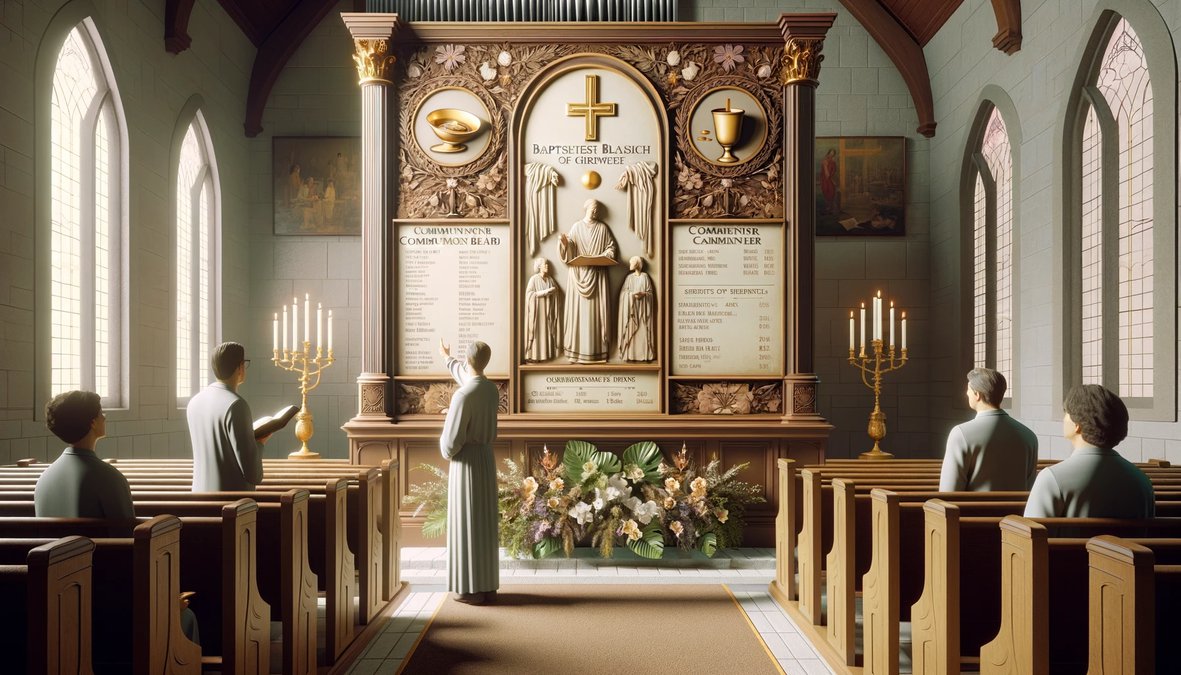Home>Theology and Spirituality>Why Do Baptists Not Take Communion Every Sunday


Theology and Spirituality
Why Do Baptists Not Take Communion Every Sunday
Published: February 19, 2024
Peter Smith, Editorial Director at Christian.net, combines deep insights into faith, politics, and culture to lead content creation that resonates widely. Awarded for his contributions to religious discourse, he previously headed a major organization for religious communicators, enhancing dialogue on faith's societal impacts.
Discover the theological reasons behind why Baptists do not partake in communion every Sunday. Explore the spiritual significance and historical context. Gain insights into Baptist beliefs and practices.
(Many of the links in this article redirect to a specific reviewed product. Your purchase of these products through affiliate links helps to generate commission for Christian.net, at no extra cost. Learn more)
Table of Contents
Introduction
The practice of communion, also known as the Lord's Supper or the Eucharist, holds profound significance in Christian faith and worship. It symbolizes the sacrificial death of Jesus Christ and the spiritual nourishment received through partaking of the bread and wine. However, within the Baptist tradition, the frequency of observing communion differs from that of other Christian denominations. Baptists typically do not partake in communion every Sunday, unlike some other Christian denominations. This distinctive practice is rooted in historical, theological, and practical considerations, as well as a scriptural basis that shapes the Baptist approach to the Lord's Supper.
Understanding the reasons behind the Baptist communion practices requires delving into the historical and theological underpinnings that have shaped this tradition. By exploring these aspects, we can gain insight into the significance of communion within the Baptist faith and the rationale behind its less frequent observance.
Historical Background of Baptist Communion Practices
The historical background of Baptist communion practices is deeply intertwined with the broader history of the Baptist tradition. Baptists trace their origins to the 17th-century English Separatist movement, which sought to reform the Church of England and advocated for a more individualized and congregational approach to faith. This historical context significantly influenced the development of Baptist beliefs and practices, including their approach to the Lord's Supper.
During the early years of the Baptist movement, there was a deliberate departure from the liturgical practices of the Anglican Church, which included the observance of the Eucharist as a central element of worship. This departure was driven by a desire to embrace a simpler and more scripturally-based form of worship that emphasized the priesthood of all believers and the autonomy of each local congregation.
As a result, Baptists adopted a view of communion that reflected their commitment to the priesthood of all believers and the symbolic nature of the Lord's Supper. This departure from the Anglican liturgical tradition led to a less frequent observance of communion within Baptist worship services. Instead of weekly or more frequent celebrations, Baptists often chose to observe the Lord's Supper on a monthly or quarterly basis, aligning with their emphasis on the symbolic and memorial aspects of the ordinance.
Furthermore, the historical context of religious persecution and the formation of Baptist churches in various regions, including America, further influenced the development of communion practices within the Baptist tradition. As Baptist congregations formed and grew in diverse cultural and geographical settings, the frequency of communion observance varied, reflecting the autonomy and diversity inherent in Baptist ecclesiology.
Overall, the historical background of Baptist communion practices underscores the influence of the early Separatist movement, the rejection of Anglican liturgical practices, and the emphasis on congregational autonomy and the symbolic nature of the Lord's Supper. These historical factors have contributed to shaping the distinctive approach to communion within the Baptist tradition, reflecting a commitment to simplicity, scriptural fidelity, and the priesthood of all believers.
Theological Reasons for Infrequent Communion
The theological reasons underlying the infrequent observance of communion within the Baptist tradition are multifaceted and deeply rooted in Baptist theology and ecclesiology. These reasons shed light on the significance attributed to the Lord's Supper and the distinct manner in which Baptists approach this sacred ordinance.
Symbolic Nature of Communion
Baptists emphasize the symbolic nature of the Lord's Supper, viewing it as a memorial and proclamation of Christ's sacrificial death and the believer's union with Him. This symbolic understanding aligns with Baptist theology, which emphasizes the priesthood of all believers and the direct access to God through Christ. As such, the emphasis on the symbolic aspect of communion contributes to the less frequent observance, as Baptists prioritize the spiritual significance and reflective nature of partaking in the ordinance.
Spiritual Preparation and Examination
Another theological reason for infrequent communion lies in the emphasis on spiritual preparation and self-examination before partaking in the Lord's Supper. Baptists place importance on approaching communion with a reverent and introspective mindset, aligning with the apostle Paul's exhortation in 1 Corinthians 11:28 to examine oneself before partaking of the elements. This emphasis on spiritual readiness and self-examination supports the less frequent observance of communion, allowing for intentional preparation and reflection leading up to the observance of the ordinance.
Read more: Why Take Communion Every Sunday
Avoiding Ritualistic Practices
Baptist theology often emphasizes a rejection of ritualistic or sacramental views of the Lord's Supper, instead highlighting its symbolic and non-sacramental nature. This theological perspective contributes to the less frequent observance of communion, as Baptists seek to avoid the potential perception of ritualism or sacramentalism that could detract from the symbolic and memorial aspects of the ordinance. By approaching communion in a less frequent manner, Baptists underscore the spiritual significance and intentional reflection associated with partaking in the Lord's Supper.
Emphasis on Word-Centered Worship
Furthermore, the Baptist tradition places a strong emphasis on the centrality of Scripture in worship and theological reflection. This emphasis on Word-centered worship influences the frequency of communion observance, as Baptists prioritize the preaching and teaching of God's Word as foundational to their worship services. While communion holds profound significance, the less frequent observance allows for a deliberate focus on the proclamation and exposition of Scripture, aligning with the Baptist commitment to scriptural fidelity and expository preaching.
In summary, the theological reasons for infrequent communion within the Baptist tradition reflect a commitment to the symbolic nature of the Lord's Supper, spiritual preparation and examination, avoidance of ritualistic practices, and a prioritization of Word-centered worship. These theological underpinnings shape the distinctive approach to communion within Baptist worship, emphasizing the spiritual significance and reflective nature of partaking in this sacred ordinance.
Practical Considerations for Communion Frequency
In addition to the historical and theological reasons, practical considerations also play a significant role in determining the frequency of communion observance within the Baptist tradition. These practical factors encompass various aspects of church life and worship, influencing the decision-making process regarding the regularity of partaking in the Lord's Supper.
Congregational Dynamics
The size and dynamics of Baptist congregations can impact the frequency of communion observance. In larger congregations, logistical considerations such as preparation of the elements, distribution to a larger number of attendees, and the time required for the observance may influence the decision to hold communion less frequently. Conversely, smaller congregations may find it more feasible to observe communion on a more regular basis, given the manageable scale of preparation and distribution.
Read more: Why Do Pentecostals Take Communion
Spiritual Emphasis and Reflection
The less frequent observance of communion allows for a heightened sense of anticipation and spiritual emphasis when the ordinance is celebrated. By spacing out the observances, Baptists have the opportunity to approach each communion service with intentional reflection, reverence, and spiritual preparation. This deliberate approach aligns with the Baptist emphasis on the symbolic nature of the Lord's Supper and the significance of partaking in a manner that fosters deep spiritual contemplation.
Communion Preparation and Significance
The less frequent observance of communion provides an opportunity for intentional preparation and emphasis on the significance of the ordinance. It allows for a focused and purposeful approach to preparing the elements, teaching on the meaning of the Lord's Supper, and guiding congregants in self-examination and spiritual readiness. This intentional preparation underscores the sacred nature of communion and contributes to a deeper appreciation of its significance when it is observed.
Pastoral Guidance and Teaching
Baptist pastors and church leaders play a pivotal role in providing pastoral guidance and teaching on the significance of the Lord's Supper. The less frequent observance allows for pastors to incorporate meaningful teaching and exhortation regarding communion into the worship services leading up to its observance. This pastoral guidance serves to enrich the congregants' understanding of the ordinance and fosters a deeper spiritual engagement when communion is celebrated.
Congregational Unity and Fellowship
The less frequent observance of communion can serve to unify the congregation and foster a sense of anticipation and unity when the ordinance is celebrated. By coming together less frequently for this sacred observance, congregants have the opportunity to unite in fellowship, reflection, and mutual encouragement as they partake in the Lord's Supper. This intentional gathering for communion reinforces the communal aspect of the ordinance and strengthens the bonds of fellowship within the congregation.
In summary, practical considerations such as congregational dynamics, spiritual emphasis, communion preparation, pastoral guidance, and congregational unity contribute to the less frequent observance of communion within the Baptist tradition. These practical factors complement the historical and theological reasons, shaping the distinctive approach to communion frequency within Baptist worship and church life.
Read more: Why Do Catholics Take Communion
Scriptural Basis for Baptist Communion Practices
The scriptural basis for Baptist communion practices is foundational to understanding the distinctive approach that Baptists take toward the Lord's Supper. Central to this scriptural foundation are the New Testament accounts of the institution of the Lord's Supper by Jesus Christ and the apostolic teachings regarding its observance.
In the Gospels of Matthew, Mark, and Luke, the accounts of the Last Supper provide the scriptural basis for the observance of communion. Jesus Christ, in instituting the Lord's Supper, used the elements of bread and wine to symbolize his body and blood, establishing a memorial of his sacrificial death and the new covenant in his blood. This symbolic act of partaking in the bread and the cup is imbued with profound spiritual significance, emphasizing the believer's participation in the redemptive work of Christ.
The apostle Paul further expounds on the significance and manner of observing the Lord's Supper in his first letter to the Corinthians. In 1 Corinthians 11:23-26, Paul delivers a teaching that underscores the solemn and reverent nature of partaking in the bread and the cup. He emphasizes the need for self-examination and spiritual readiness, highlighting the gravity of the ordinance and its significance in proclaiming the Lord's death until he comes.
Baptists draw from these scriptural passages to shape their communion practices. The symbolic nature of the Lord's Supper, as established by Christ and expounded upon by the apostles, aligns with the Baptist emphasis on the memorial and proclamation of Christ's sacrificial death. This scriptural foundation underscores the spiritual significance and reflective nature of partaking in the ordinance, informing the less frequent observance that allows for intentional preparation, spiritual contemplation, and communal unity.
Furthermore, the scriptural emphasis on the believer's priesthood and direct access to God through Christ resonates with the Baptist theology of the priesthood of all believers. This theological perspective informs the approach to communion, emphasizing the spiritual participation and individual reflection inherent in the observance of the Lord's Supper.
In summary, the scriptural basis for Baptist communion practices is rooted in the New Testament accounts of the institution of the Lord's Supper and the apostolic teachings regarding its observance. These scriptural foundations underscore the symbolic nature, spiritual significance, and reflective emphasis of the Lord's Supper, shaping the distinctive approach to communion within the Baptist tradition.
Conclusion
In conclusion, the distinctive approach of Baptists toward the observance of communion, characterized by its less frequent practice, is shaped by a rich tapestry of historical, theological, practical, and scriptural considerations. The historical roots of the Baptist tradition, stemming from the 17th-century English Separatist movement, set the stage for a departure from Anglican liturgical practices and a deliberate embrace of a simpler, more scripturally-based form of worship. This departure influenced the development of Baptist communion practices, leading to a less frequent observance that aligns with the emphasis on congregational autonomy and the symbolic nature of the Lord's Supper.
The theological reasons for infrequent communion within the Baptist tradition reflect a commitment to the symbolic nature of the ordinance, spiritual preparation and examination, avoidance of ritualistic practices, and a prioritization of Word-centered worship. These theological underpinnings underscore the significance attributed to the Lord's Supper and the distinct manner in which Baptists approach this sacred ordinance.
Practical considerations, including congregational dynamics, spiritual emphasis and reflection, communion preparation and significance, pastoral guidance and teaching, and congregational unity and fellowship, further contribute to the less frequent observance of communion within the Baptist tradition. These practical factors complement the historical and theological reasons, shaping the distinctive approach to communion frequency within Baptist worship and church life.
Moreover, the scriptural basis for Baptist communion practices, drawn from the New Testament accounts of the institution of the Lord's Supper and the apostolic teachings regarding its observance, underscores the symbolic nature, spiritual significance, and reflective emphasis of the ordinance. This scriptural foundation informs the less frequent observance that allows for intentional preparation, spiritual contemplation, and communal unity, aligning with the Baptist emphasis on the memorial and proclamation of Christ's sacrificial death.
In essence, the less frequent observance of communion within the Baptist tradition serves as a testament to the deep theological convictions, historical roots, and practical considerations that shape the worship and spiritual life of Baptist congregations. It reflects a commitment to simplicity, scriptural fidelity, and the spiritual significance of the Lord's Supper, inviting congregants to approach this sacred ordinance with reverence, reflection, and communal unity.












